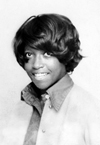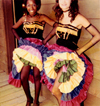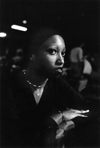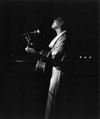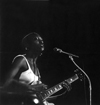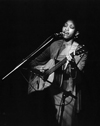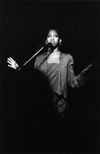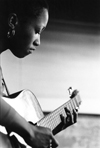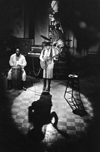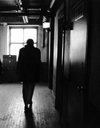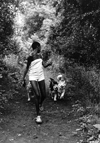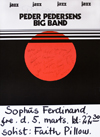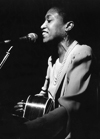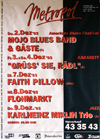Hi. I'm Faith Pillow. Yes, it's my real name. Everybody thinks it's one of those goofy '70s band names, but it's not. I'm a late Leo, born in Louisville, Kentucky, on August 22nd of 1954. I'm a dozen years younger than Muhammad Ali, who was my neighbor. In fact, my daddy, Lucian Pillow, was friends with his daddy. They were both painters. His daddy painted signs, mine painted interiors. I must have got my artist genes from my daddy. I look like him, too. He was no musician, but he loved music and took me around with him. That was me, a little kid hanging out in the clubs.
The rest of my family was my younger brother John C., my older sister Hope, and my mom Archie, who was a psych nurse. For her, the world was the crazy part and the not-crazy part. For me, growing up in the '50s and '60s, the world was the black part and the white part. This was set off in an odd way by my aunt, who helped raise me.
My aunt owned a big old house at 27th and Chestnut Street. My family occupied one of the floors. Now my aunt looked for all the world like a white woman. Well, I think she really was a white woman. When she was a little girl, her father, who was white, dropped her off one day down in southern Kentucky at the farm of one of my relatives, and he never came back. That's where she stayed and that's where she grew up. She adapted to the situation by reinventing herself as a pretty young black woman who was an absolute champ at passing for white. That was her source of power. She made a career out of it, first as a high-class entertainer in the clubs of Hopkinsville and then as a kind of neighborhood celebrity in Louisville. Many an afternoon, you could see her sitting, all alone, in the center window of the fanciest white lounge in town--a white woman passing as a black woman passing as a white woman.
That was America. Every little thing had its black-white angle, but my aunt was one twist too many. I made up my mind early on that black-white was not going to define me, and in a funny way, my aunt helped me out with that, even though she was crazy as hell and mean as a badger, especially to me. She helped me out by sending me to Catholic school, even though my family was all Baptist.
Now Catholic school was hardly free of the black-white attitude. Take one of my teachers, Sister Mary Back-to-Africa, who thought my long legs would be better off chasing game. Catholic school also seeded my psyche with its own spooky ideas. Years later, when I was living in Europe, I went to the Uffizi, the picture gallery of Florence. Its central room has three massive Renaissance altar pieces, Mary and the baby Jesus to the left, Mary and the baby Jesus to the right, Mary and the baby Jesus front and center, cinerama-style. The moment I entered, I broke a drenching sweat. My knees buckled. I had to be helped out of the building.
But Catholic school did give me a decent education and eventually brought me to Father Vernon Robertson, who encouraged me in my music and showed me how to deal with the world. Our church, St. Charles Borromeo, was right across the street. It was one of the first places I performed in public. I even wrote and performed a kind of folk mass there, in August of '69.
My mom had given me my first guitar when I was nine. On summer evenings, I went up on the roof with my dog to play and sing songs till late into the warm night. I never took any guitar lessons, but I started getting good pretty fast. Anyway, I guess I did 'cause nobody ever told me to stop.
I started doing little gigs around town, private parties and stuff, and when I was twelve, I got my first contract. Sounds exciting, doesn't it? I thought so too, at first, but it ended up poisoning me on contracts for the rest of my life. The deal was for four years. The guy who signed me up managed a couple of regional acts, among which was an R & B band in need of a lead singer. I was young, skinny, pretty, all legs. Except for my hair, I looked the part. I've got this hair that never grows more than a quarter inch high. Oh, it grows, but it just curls in, in ever tighter little coils. But this was Afro-days, so he put me on stage in a huge blowout wig.
I didn't mind the wig. The problem was, he just wanted me for the look, a prop to make his sleazy little band worth the price of a ticket. But I already knew that I was interested in making some real music. I didn't want to be a chick singer or somebody's prop. I stopped performing with the band and told the manager I wanted out, but he would not let me break that contract.
So I did my own thing, kept getting better, and ran out the four years. In the meantime, I transfered to Atherton High School, got bored, applied early to the University of Kentucky, and was accepted on my fifteenth birthday. I still wasn't sure I wanted to be a professional musician, so the next year I applied for early admission to the med school and was accepted. If I was going to go away to university, I needed a little money, so I got a job as a cancan dancer in an old west show at a local theme park called Ghost Town on the River. Then one day they needed a singer, so I tried out and got the gig.
Dee Felice, who had a jazz quintet based in Cincinnati, heard me and asked me to join his group. That was the moment of decision. It was to be music, not doctoring, and I packed off to Cincinnati. We worked the Playboy Club there, and during the fall and winter of '72-'73, we went on the road. We performed in New York City, did Caesar's Palace and the Sahara in Las Vegas, and played the Caribbean circuit--Jamaica, Aruba, St. Thomas, St. Croix, and Haiti.
At Port-au-Prince, we were featured entertainers for the entourage of one Papa Doc, the infamous dictator and voodoo bogeyman. Each of us had our own bungalow on the grounds of the presidential compound, the fortress protecting the president's skin from the hands of his adoring people. The compound was nice when we were performing and munching lobster, but the rest of the time it was a bore. So one afternoon, I went out through the big gate into the city. I did not get far. A man I did not know, but whom I had seen around the compound, came running after me. "Are you crazy, coming out here by yourself?" He gently escorted me back to the compound.
We had a couple of drinks and got to talking. He was a good-looking New Yorker who obviously knew what I did but was a little vague about what he did. He said he was involved with security for the compound and took care of 'certain kinds of business' for our friends in Haiti. "You mean you're a hitman?" He responded to my directness: "A close-proximity hitman, dear." "Ah, a specialist. What is a close-proximity hitman?" "Just what it says. You put the weapon right to the guy's head. None of this sniper crap, not if you want to make sure the job get's done." I was beginning to see that in my life, I was going to be making interesting friends.
The season with the quintet was good, but I was still just a front singer, and I was beginning to think about having a band of my own. So in the summer of '73, I went to New York City. I had to give it a try, didn't I?. I worked for awhile as half of a lounge act, a kind of black Sonny and Cher thing. And I kept making those interesting friends. But I still didn't have my own band. Also, I knew I could write better music than I had been performing.
So I left bands and lounges behind. I took my guitar and went out on the folkie circuit between Chicago and Detroit. I was no folk singer. I sure didn't look like a folk singer, but the folk clubs gave me a chance to start trying out some original tunes. I settled in Kalamazoo, Michigan, which gave me a little bit of peace and space. Peace and space are not easy to find in New York, and if you do find them, you have to fight for them, which kinda defeats the purpose.
What kind of music is 'my music'? The question has trailed me everywhere and forever. When I was learning how to play, I listened to singer-songwriter stuff, Joni MItchell, Bod Dylan, John Lennon, Crosby, Stills, and Nash. I liked good songs, real compositions, not just a sound or a bunch of riffs strung together. But in those days, the industry had no place for somebody like me doing a singer-songwriter thing. Oh well. Just had to forget about the fast track to the big record deal. I decided to move to Chicago and get me a band.
In May of '75, I moved to Chicago's near North Side. I went to audition at a club called Somebody Else's Troubles at 2470 N. Lincoln Avenue. At the time, North Lincoln Avenue was one of Chicago's most vital music scenes. I didn't get the gig, but the owner of the jazz venue next door, Ratso's, happened to be there, and he hired me. So I put a band together and began working. That first band didn't work out and I let them go after a few months.
My second band was my first really good band. I had Frank Donaldson on drums, who was also a member of Ramsey Lewis' trio, Nicholas Brown on guitar, Penn McGee on percussion, Mitchell Hennie on bass, and Ed Tossing on piano. Before long, I brought in Richard Curtis as my main guitar player.
By this time, I was working a lot. I also began writing music. In '76, I wrote my first good tune, Come On Down, then Love Me Right and County Fair. In '77, I wrote Renaissance, Sanity, Melinda, and began performing my own arrangement of Blackbird (Lennon/McCartney). Also in '77, I wrote and performed Blue Man for Stony Island, a film about the Chicago music scene.
My band and I performed at Chicagofest in '77 and '78, and in '78 I got my first gig--two weekends in a row--at Orphans, 2463 N. Lincoln Avenue, one of Chicago's best music rooms. In October, I started working at Redfords, 2458 N. Halstead, another prime music club. From then on, I was a regular at these two venues. I was also working other rooms, such as Collette's and Wise Fools.
In '78, I wrote Being Loved, Stronger, Colette's, and You Make Me Feel. In '79, I wrote Winston (first called Ernie--Ernie didn't last long, so I named the tune after my loyal malamute, Winston), Seems Like Lately, and my signature tune Shady Lady. It was also in '79 that I began working with Muddy Waters. I didn't play any blues, but he liked me and had me as his opening act when he was in the area. I wrote the tune Style for Muddy.
In '80, I wrote Baron's Blues and You Brighten Up My Day. By this time I had a solid band, consisting of Tom Taylor on piano and keyboard, Richard Curtis on guitar, Bill Dickens on bass, and Jim Hines on drums. Paul Merar came on board to play bass when Billy Dickens was unavailable, and Harold Morrison and Brian Griese occasionally played drums.
In '80, I formed my production company, Faith Pillow Ventures, and my publishing company, Hot Mambo Music. In 1981, I produced my first album, Faith Pillow, recorded live at Orphans. This album was a small release, but it acquired a certain cult status. Years later, a copy of this album somehow made its way to Tokyo, where it got a fine review that led to its eventual rerelease on the Celeste label.
In '81, I joined BMI as a songwriter, and wrote Makes Me Know and Early In The Morning. In '82, I wrote Wake Up, Rock and Roll World, Mystery, Loved and Alive, Property, and Loved You For A Lifetime.
In '83, I was invited to do a three-month gig at Jakob's in Aarhus, Denmark. The gig was during the winter of '83-'84, one of the worst in many years. Snow was up to the second floor windows. In addition to working at Jakob's, I toured Denmark, did radio and television shows, and got to work with people like Thad Jones and Peder Pedersen. I liked working in Europe, but in Denmark I was not doing my own music. This seemed like a step backward, so I left in the spring. Before returning to the States, I traveled through Italy Greece, and Egypt.
In '84, I returned to the States, bought a small house on Bernal Heights in San Francisco, and started doing some studio work at Scotti Brothers Studio in Santa Monica. In September of '85, I signed a contract with Ascension Artists, a management company involved with the Stallone organization. I worked in L.A. from '85 into '87, but the bizarre business practices of my management company left me with a bad taste. Furthermore, things were shifting in the music business. Live venues were shutting down and singer-songwriters were not getting a lot of support from an industry that was looking for quick returns on investment.
A fresh opportunity presented itself in Europe, so in February of '89, I moved to Amsterdam and took a small flat on the Oude Zijds Achterburgwal, right in the heart of the old city. I quickly built up a following in Amsterdam through live performances, radio, and television. The following summer I began touring.
In January of '95, I signed a record contract with VAN Records of The Hague. The album Sanity, was released in '95 and Run In The Sunshine in '96. During my years in Europe, I had the pleasure of working with two very fine musicians, Jos Van Es on bass and Konstantin Ivanov on drums. The three of us were the Faith Pillow Trio.
During my time in Europe, I wrote Wish, Morning In Your Eyes, Run In The Sunshine, Mean Streets, Take The Time, Hard To Sleep, How Did It Go So Wrong, I've Forgoten How It Feels, and others. I wrote Face Tomorrow, One Day, Give It Time, and Key To My Heart for the album Run In The Sunshine.
By the end of 1996, I felt that I had done just about all I could do in Europe and decided to give the States another try. In December of '96, I went back to my old home town, Louisville, to see my family again, catch a breather, and start making some plans. I wrote Vision, Turn Around, Love Is A Big Risk, and Destiny. At first, it looked like some good things might be happening. The Celeste label of Tokyo rereleased my first album, and other recording artists were showing some interest in my tunes. But, health problems of long standing began to catch up with me. After a sudden serious crisis, I passed away during emergency surgery on the sixth of November, 2003.
That's just how things go, sometimes. Looking back, I had many successes, got a little bit famous, released some albums, toured on two continents, worked with wonderful musicians, and wrote my own songs. I supported myself with my music, never had any other job, and managed to do my music on my own terms. I'm proud of my music and am happy to offer it to you, as always, with love. Till we meet again, Faith.
